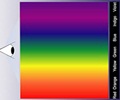Even when people are not consciously aware of the experience, they can feel synaesthesia- a condition that involves "seeing" colours when reading words and numbers.
Many previous studies have shown that the brains of people who experience this phenomenon are different from those who do not.In a new study, researchers from the University of Padova, Italy, have discovered that learning may also play an important role in synaesthesia and can lead to synaesthetic behaviour even when the person is not consciously aware of the experience.
Dr Ilaria Berteletti and colleagues tested an Italian synaesthete using a classic test, in which the participant was shown a series of numbers presented in different ink colours and asked to name those colours.
A synaesthete for whom the number 2 is red will find it more difficult to name the ink colour of a green 2 than if the number is presented in red ink and will take longer to respond.
The slowing of response is generally taken as evidence that synaesthetic experiences are real and automatic.
As predicted, the participant in this study was slower to name the colours of the presented Arabic digits when they did not match the colours that he had reported "seeing."
Advertisement
The results suggested that the mere concept of a number, regardless of how it was presented visually (as an Arabic digit or pattern of dots), was enough to produce the marker of synaesthetic behaviour, even when the participant was not conscious of experiencing synaesthesia.
Advertisement
The study will be published in the February 2010 issue of Cortex.
Source-ANI
TRI









